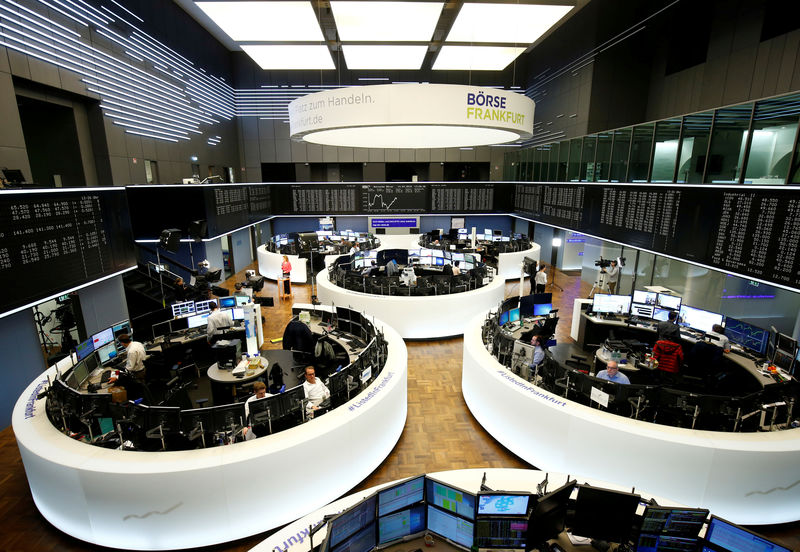This post was originally published on this site
https://i-invdn-com.akamaized.net/trkd-images/LYNXMPEFA61SB_L.jpg
By Thyagaraju Adinarayan and Saikat Chatterjee
LONDON (Reuters) – A proposal to shorten trading hours on Europe’s stock exchanges could help to boost liquidity and would have far-reaching benefits for the industry’s hard-working traders.
But a proposed 90 minute reduction in the trading day could also drive some business away from Europe’s main stock exchanges into so-called dark pools, trading venues which are less transparent and which regulators have been trying to curb.
Banks and fund managers on Thursday have proposed shortening the trading day in Europe to 7 hours from current 8-1/2 — one of the longest in the world.
The London Stock Exchange (L:), which has said it will consider the proposals, has been operating its FTSE 100 index () from 0800 London local time to 1630 for the last twenty years.
In 1999, the FTSE started trading one hour earlier to synchronise its trading hours with rest of Europe but Thursday’s proposal recommends a reversal of that.
The new hours would mean a 30 minute reduction in an overlap with the United States’ stock exchanges, which analysts and industry experts believe could be detrimental for the LSE, Europe’s leading stock exchange as well as for its continental European rivals.
“London’s great strength is overlapping both the Asian and U.S. trading hours,” said Chris Bailey, European strategist at Raymond James. “I think the current set up is about right.”
But the Association for Financial Markets in Europe (AFME), a banking industry body, said the shorter hours would improve liquidity which has been hit by the growth of passive and index-tracking funds.
The popularity of passive investing is draining liquidity in Europe’s $11.1 trillion equities markets as products like exchange-traded funds and hedge funds use end-of-day prices set during the exchanges’ closing auctions for their daily pricing.
This means the final five minutes of trading has become the busiest time of day for stock market traders with a third of a day’s average trade volume going through in the final hour.
https://fingfx.thomsonreuters.com/gfx/mkt/12/4751/4713/closing%20auctions.png
“Shortening the hours would concentrate liquidity leading to more consistent trading costs and provide greater time for traders and the market to digest corporate announcements,” AFME and the UK-based Investment Association said.
AFME’s argument on liquidity is largely supported by the industry, but there are also concerns that shorter hours could drive more business into off-market venues known as dark pools.
This would hinder the European markets regulator’s efforts to curb off-market trading, where trades do not contribute to price formation and there is less transparency.
These off-market trading venues have become popular because they can allow large investors to avoid prices moving against them when they execute big stock trades.
“Shorter trading hours can drive trading liquidity to off market venues,” Bilal Hafeez, CEO of MacroHive, a macro research and strategy firm based in Britain, said.
“With market making costs going down thanks to the rise of algorithmic trading and more market moving news such as trade and politics coming outside market hours, shorter trading hours is not ideal.”
In July, trading in such off-market venues accounted for 9.6% of all on-exchange activity, according to data compiled by capital markets advisory firm Tabb Group. This was its highest level since the European Union rules aimed at increasing transparency in financial markets came into effect in Jan. 2018.
Ben Springett, Head of European Electronic and Program Trading at Jefferies, said off-market venues could increase the competitive pressure by opening earlier and closing later than the main markets and that this would be counter-productive.
“The crucial aspect would be to retain relative harmony across the various European primary exchanges and alternative venues,” Springett said.
For hard-working equity sales traders the cuts would give them some breathing space to prepare for the early morning rush.
“We all get in earlier than the open. But to have an extra hour to prepare would mean a way less frenetic rush premarket to gather, digest and inform on the news and issues that really matter,” said Mark Taylor, sales trader at Mirabaud, a broker.
The shorter hours could help boost diversity in the industry.
The Financial Conduct Authority, which regulates share trading in Britain, said last month the number of women in senior financial roles had flat-lined since 2005 despite the sector’s “rhetoric” on diversity, with broking firms faring worst.
“I don’t think anyone working in this industry could see this move (shorter trading hours) as negative because we all work extra-long hours,” said a female sales trader at a European bank, who declined to be named. “Our day is 11 hours long not eight as they say.”

